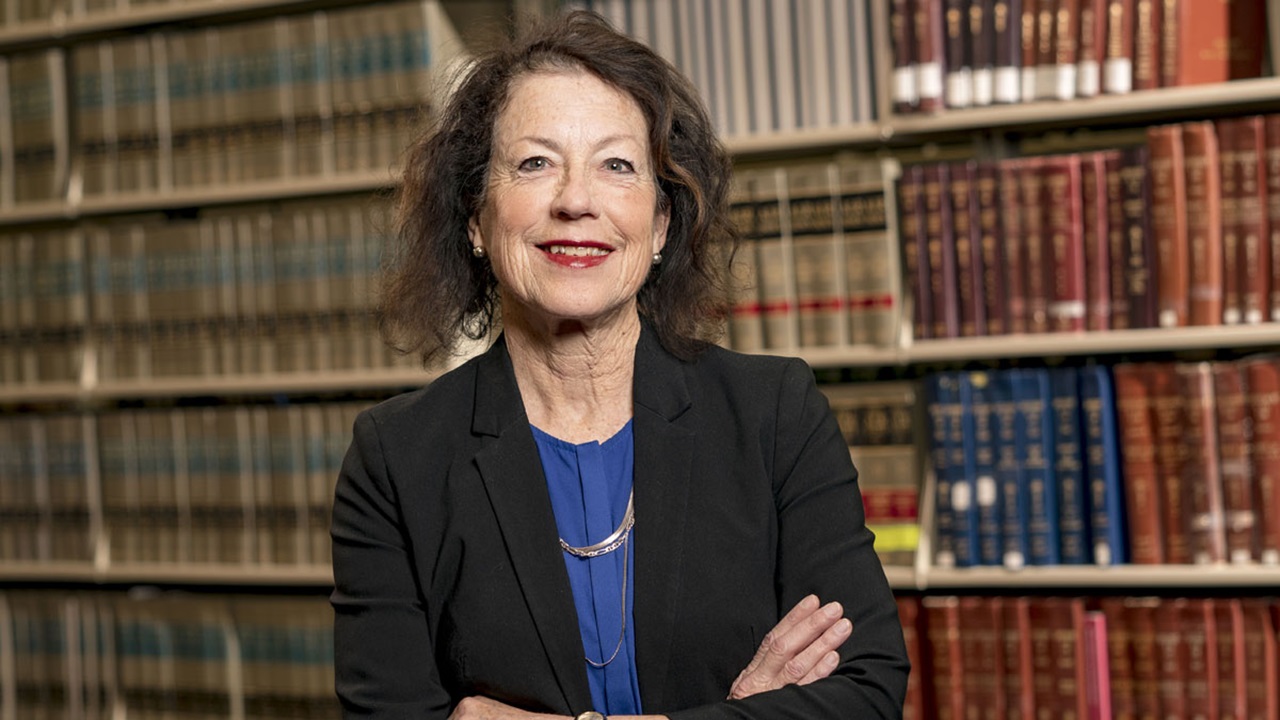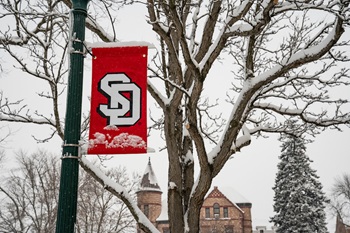Chris Hutton, Mentor for Women in Law, Retires After 35 Years at USD Law

“It certainly wasn’t the weather,” Hutton said with a laugh. “It snowed in September my first year here. I had never been in subzero temperatures.
“It was the people,” she continued. “The students, the faculty–I have enjoyed working with the people here most of all.”
Eventually, Hutton would even come to enjoy the bucolic setting provided by rural Clay County.
“We found a house out in the country. We had to have a tractor plow our road. It was a new adventure. And we loved it,” Hutton said.
Hutton’s path to the USD School of Law was long and winding. A native of Philadelphia, Pennsylvania, she earned her bachelor’s degree in history from St. Joseph’s University in 1973 before completing her Juris Doctor degree at Washburn University in 1978. From there she entered the U.S. military, serving in the Judge Advocate General’s Office for four years, practicing criminal defense and administrative law.
“I met a lot of fantastic people and it turned out to be something I benefited from greatly,” Hutton said. “I certainly think it made me stand out.”
In 1984, Hutton earned an LL.M. degree from Harvard University, which is where her interest in teaching was first kindled.
“I had never given much thought to teaching, but the LL.M. program was successful in helping graduates get teaching positions and when the job opened up in Vermillion, we knew it was a unique community right away,” she explained.
At the USD School of Law, Hutton thrived in both teaching and scholarly research. During her career, she would win the USD School of Law John Wesley Jackson Award four times, in 1986, 1999, 2013 and 2017; the USD Dean Marshall M. McKusick Award in 2015; the USD Belbas-Larson Award for Excellence in Teaching in 2008; and the USD Women in Law Attorney of Year Award in 1997.
In her estimation, both teaching and research required a great deal of attention.
“You have to work on everything at the beginning,” said Hutton. “But I loved working with the students.”
In particular, the law school’s female students gravitated toward Hutton. “Law has always been a predominantly male career but seeing the way Professor Hutton commands attention is something you notice,” said Abbey Farley, a first-year law student who took Criminal Law from Hutton last fall. “She makes you think, ‘If she can do it, why can’t I?’”
“I thought it was great for the female students to see a professional woman on the faculty,” Hutton said. “How do you conduct yourself? How do you manage challenges in the family? I was very much interested in working with women students in that regard.
“I came from the Army where I was often the only woman in the room,” she continued. “I was very conscious of helping our students
navigate those challenges.”
Military students, too, found common ground with Hutton. “I enjoyed working with students who had that experience. I think they appreciated that I understood their perspective,” she said.
In terms of research, Hutton earned a reputation as a widely-respected legal scholar. In 1986, she gave what she thought would be a one-time lecture to members of the South Dakota judiciary on criminal law and procedure substituting for the scheduled speaker. Instead, she was invited back every year by the Unified Judicial System to provide training to the state’s judges presenting on the implications of recent U.S. Supreme Court and South Dakota Supreme Court cases.
“Whether it’s her students, people in the profession, people on the bench–they have a tremendous respect for Chris, her work, her balance,” said Professor Frank Pommersheim, who started teaching at USD law the same year as Hutton, in 1984. “She’s made significant contributions in that regard.”
In 1993 she began teaching Evidence and would literally rewrite the book on the subject, completing an overhaul of the treatise, South
Dakota Evidence, by John Larson, finishing a 2nd edition in 2013.
Additionally, she published the South Dakota Criminal Law and Procedure Review annually. Much of her work included commentary on the death penalty, evidence issues in criminal trials, retroactivity and standards of review.
In 2008, one of Hutton’s pieces was quoted by U.S. Supreme Court Justice John Paul Stevens, writing for a 7-2 majority opinion in Danforth v. Minnesota in a decision that clarified the broad fashion in which states may review their own retroactive criminal convictions.
Additionally, Hutton engaged in extensive service work, including membership on the ABA Standing Committee on Armed Forces Law, the State Bar Committee for the Active Participation of Women in the Bar and the Board of Bar Commissioners for the South Dakota Bar (2004-07).
Committed to providing legal services to those with low incomes, she served as a board member for Access to Justice (a partnership of the state bar and legal services programs to increase access to legal services for low income individuals) and Dakota Plains Legal Services.
In 2009, her scholarly research and service work would turn into advocacy, as she led a successful effort to lobby the South Dakota legislature to pass a DNA exoneration statute.
“We wanted to start an Innocence Project chapter at USD and realized South Dakota didn’t have the statutes necessary to allow someone to challenge their conviction based on testing of DNA evidence,” Hutton said.
After the statute was changed, Hutton supervised about 30 law students annually who volunteered to investigate claims of innocence raised by inmates in the South Dakota penitentiary system.
"Law has always been a predominantly male career but seeing the way Professor Hutton commands attention is something you notice. She makes you think, 'If she can do it, why can't I?'" - Abbey Farley, a first-year law student who took Criminal Law from Hutton last fall.
The courses she instructed also became something of a rite of passage, as she taught Evidence and either Criminal Law or Criminal Procedure in rotation with Pommersheim.
“She’s very experienced both as an attorney and as a professor,” said Aidan Goetzinger, a second-year law student who worked with Hutton as her teaching assistant. “She has a way of making the abstract concrete. She can make difficult topics easy to comprehend.”
Pommersheim said their teaching partnership began almost as an accident, but benefited from their similar attitudes and upbringings.
“We started teaching Criminal Law and Procedure in alternating sections roughly 25 years ago,” said Pommersheim. “We have a slightly different count when we talk about it. “We had never met before we arrived on the shores of the law school, but we were both from the East Coast,” Pommersheim said. “So, without ever really talking about it, we had the same attitude–same ethos. You work hard every day. You show respect–for your students, for your colleagues.”
Respect is one theme both professors tried to emphasize.
“To practice in criminal law, there’s a whole lot of interaction with clients,” Hutton said. “You need to be able to communicate and work with different people–you need to look people in the eye and deal with everything humans deal with in your office. It’s not remote. It’s intensely personal.”
And for Hutton, teaching was personal, too.
“Students have a great deal of affection for her. They respect her. Chris has always been a role model for students, women students especially,” said Pommersheim. “Students easily relate to her.”
This approach benefited students who connected with Hutton on a personal level.
“She understands the plight of the law student,” Goetzinger said. “She does a really good job of not letting you drown too much in what you’re learning and she’s willing to talk to students about anything and everything. Her door was always open.”
That commitment to student success extended beyond her office hours. “For me, what really set Professor Hutton apart is her dedication to students’ success outside of the classroom. I had the opportunity to go to a moot court competition in New York City with Professor Hutton,” said Erin Willadsen, a third-year law student at USD. “She gave up part of her spring break to have Skype practices and drove down to Vermillion other days. She was critical to our success.”
Goetzinger agreed. “More than anything, she gave me confidence. She’s an excellent professor and an even better person. I wouldn’t be the student I am today without Professor Hutton’s guidance.”
“She’s definitely going to be missed,” said Pommersheim. “It’s true in the life of any institution, but it will be difficult to fill her
shoes. The students who have had her over this quarter century-plus are really fortunate.”
As she reflected on the last months of a prolific career, Hutton couldn’t help but think of what the School of Law was like in her early teaching days. “When we first got here, the library was packed at night. We used to have fights about how long we kept it open,” Hutton said. “It made faculty and student interaction more extensive.”
It’s that interaction and focus on people that most appealed to Hutton in her first years at USD law, and it’s an attribute to which she hopes the school always remains true.
"Ability, hard work, good ethical standards,” Hutton said, describing the universal characteristics of a good law student, whether in 1984 or today. “I’ve been blessed to work with many students who have fit that mold. It made them good attorneys and outstanding people.”



